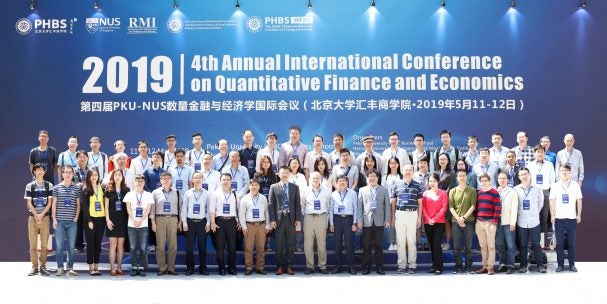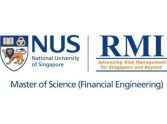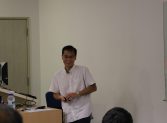| |
RMI Hosts the 4th PKU-NUS Annual International Conference on Quantitative Finance and Economics
|
|
|
| |
RMI collaborated with Peking University’s (PKU) HSBC Business School, Key Laboratory of Mathematical Economics and Quantitative Finance and The HSBC Financial Research Institute at Peking University to host the Fourth PKU-NUS Annual International Conference on Quantitative Finance and Economics on 11 and 12 May 2019. The conference was held at PKU’s HSBC Business School, in Shenzhen, China with over 100 participants, including members from the industry, academia and students, in attendance. The conference featured a two-day scientific program, which followed the format of an academic conference. The first day of the conference began with the opening remarks from A/P Ren Ting, Associate Dean of PKU HSBC Business School, Prof. Sun Yeneng, Acting Director of NUS RMI, and Prof. Yang Jingping, Associate Director of Key Laboratory of Mathematical Economics and Quantitative Finance, PKU. Prof. Thomas J. Sargent, Nobel Laureate, Professor of Economics at New York University, and Director of Sargent Institute of Quantitative Finance, Peking University, was invited to give a keynote lecture on “Risk, Uncertainty, Value, and Public Policy”. He talked about “uncertainty” and explained how the concept “entropy” is used to measure uncertainty. He further mentioned how uncertainty can affect public policies. This was followed by three sessions, which were split into two simultaneous tracks. In these three sessions, there were a total of 30 presentations of research papers on topics such as computational finance, financial modelling, mathematical economics, and microeconomics and portfolio selection.
|
|
| |
RMI Co-Hosts the 4th Berlin-Princeton-Singapore Workshop on Quantitative Finance and the HUB-NUS Workshop on Fintech
|
|
|
| |
The 4th Berlin-Princeton-Singapore Workshop on Quantitative Finance, organized by NUS’s Institute for Mathematical Sciences and Risk Management Institute and supported by Humboldt University of Berlin and Princeton University, was held from 18 to 20 March 2019. A total of 21 speakers were invited from universities such as Hong Kong University of Science and Technology, Humboldt University of Berlin, NUS, Princeton University, Ritsumeikan University, Shanghai Advanced Institute of Finance, and Technische Universität Berlin. Day one of the two and a half day workshop featured nine presentations on topics such as portfolio liquidation models, asset securitization, systemic risk, bitcoin mining, liquidity, market prediction, investments, logistic regression, and optimal liquidation. Day two featured seven presentations on topics including, trading and market impact, default contagion, EVE correlation models, portfolio diversification and model uncertainty, and optimal portfolio liquidation among others. Lastly, the half-day program on 30 March, featured five talks on topics related to non-concave portfolio optimization, optimal investment and consumption, stochastic resilience, Poisson autoregressive model, etc.
|
|
| |
The Very Obviousness of a Problem Makes Us Vulnerable to Ignoring It: An interview with Michele Wucker
|
|
|
| |
In this interview, RMI's Adjunct Professor Lutfey Siddiqi talked to policy strategist and author of the book Gray Rhino, Michele Wucker, who coined the term "gray rhino" as a metaphor for the probable risks that are not being resolved despite their obviousness. The term is now used in mainstream discourse to explain what might have moved markets or shaped financial policies. Chinese President Xi Jinping moved markets in January when he warned of the need to watch out for gray rhinos along with highly improbable black swans. Wucker introduced the gray rhino metaphor at the 2013 Annual Meeting of the World Economic Forum in Davos and developed a framework around the metaphor in her 2016 book, the international bestseller, THE GRAY RHINO: How to Recognize and Act on the Obvious Dangers We Ignore.
Lutfey Siddiqi: So what is a gray rhino, and how is it different from the black swan? Michele Wucker: The gray rhino is the obvious, probable danger that gets neglected, downplayed, or outright ignored, despite, and often because of, its size and obviousness. The black swan, the highly improbable, high impact event that is impossible to picture ahead of time, became popular during the subprime mortgage induced crisis of 2008-2009. The intention of the concept was good: to make people aware that they were more vulnerable than they thought to surprises.
|
|
| |
Wang Dongxu joined RMI’s CRI Team as a Research Analyst on 15 February 2019. Dongxu (Celeste) graduated from NUS Information Systems in 2016 and has previously worked at Garena as an IT Product Manager. She loves traveling, gym training, reading books, and watching Japanese comics.
|
|
| |
Distinguished Visitor
|
|
|
| |
Prof. David Yao visited NUS from 5 to 10 May 2019 as part of the NUS Finance & Risk Management Cluster's Interdisciplinary Speaker Series. Prof. Yao is the Piyasombatkul Family Professor of Industrial Engineering and Operations Research at Columbia University, where he is the Founding Chair of the Financial and Business Analytics Center at Columbia Data Science Institute, and more recently, Co-Director of the Columbia Fintech, AI and Business Analytics (FABULYS) Initiative. His research and teaching interests are in applied probability and stochastic systems, focusing on resource control and risk management issues.
|
|
|
| |
|
NUS MFE Early Admissions
April 2019
|
|
|
MFE Information Sessions – Beijing and Shanghai
24 & 28 April 2019
|
|
NUS RMI Specialist Diploma in Credit Risk Management – Corporate Banking
5 March to 9 May 2019
|
|
|
|
|
| |
18 May to 19 Oct 2019
Financial Risk Manager (FRM®)Certification Training Program 2019 May Intake
Read more » 15 May to 15 June 2019
NUS RMI Specialist Diploma in Operational Risk Management
Read more » 22 Jul - 31 Aug 2019
IMS Program on Quantitative Finance (Jointly Organized with RMI)
Read more » 25 July 2019
Thirteenth Annual Risk Management Conference
Read more »
|
|
|




